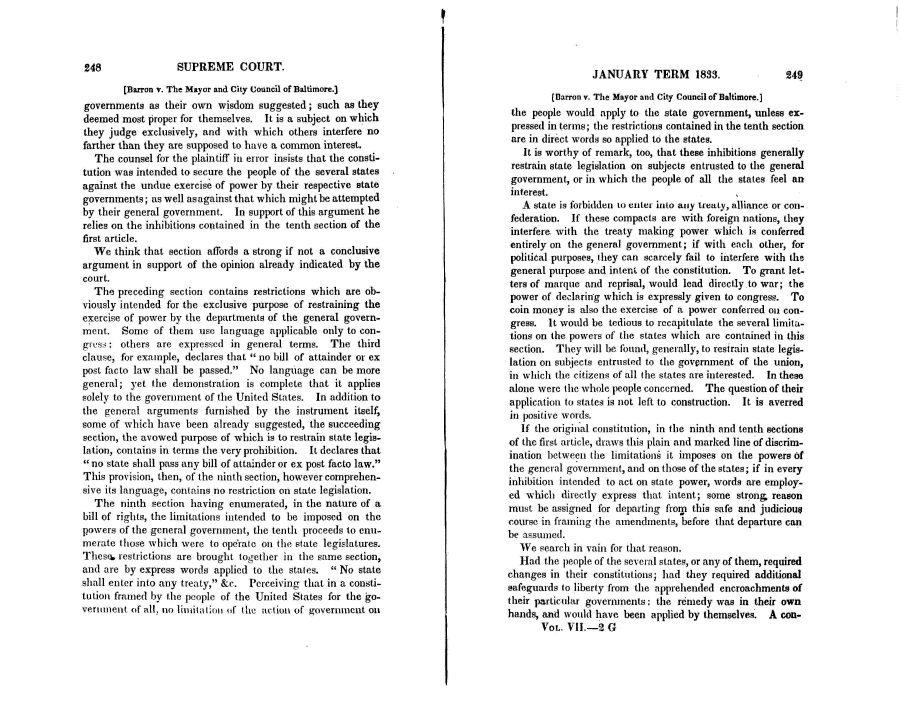|
248
SUPREME COURT.
[Barren v. The Mayor and City Council of Baltimore.]
governments as their own wisdom suggested; such as they
deemed most proper for themselves. It is a subject on which
they judge exclusively, and with which others interfere no
farther than they are supposed to have a common interest.
The counsel for the plaintiff in error insists that the consti-
tution was intended to secure the people of the several states
against the undue exercise of power by their respective state
governments; as well as against that which might be attempted
by their general government. In support of this argument he
relies on the inhibitions contained in the tenth section of the
first article.
We think that section affords a strong if not a conclusive
argument in support of the opinion already indicated by the
court.
The preceding section contains restrictions which are ob-
viously intended for the exclusive purpose of restraining the
exercise of power by the departments of the general govern-
ment. Some of them use language applicable only to con-
gress : others are expressed in general terms. The third
clause, for example, declares that " no bill of attainder or ex
post facto law shall be passed." No language can be more
general; yet the demonstration is complete that it applies
solely to the government of the United States. In addition to
the general arguments furnished by the instrument itself,
some of which have been already suggested, the succeeding
section, the avowed purpose of which is to restrain state legis-
lation, contains in terms the very prohibition. It declares that
" no state shall pass any bill of attainder or ex post facto law."
This provision, then, of the ninth section, however comprehen-
sive its language, contains no restriction on state legislation.
The ninth section having enumerated, in the nature of a
bill of rights, the limitations intended to be imposed on the
powers of the general government, the tenth proceeds to enu-
merate those which were to operate on the state legislatures.
Theso, restrictions are brought together in the same section,
and are by express words applied to the stales. " No state
shall enter into any treaty," &c. Perceiving that in a consti-
tution framed by the people of the United States for the go-
vernment of all, no limitation (if the action of government on
JANUARY TERM 1833.
249
[Ban-on v. The Mayor and City Council of Baltimore.]
the people would apply to the state government, unless ex-
pressed in terms; the restrictions contained in the tenth section
are in direct words so applied to the states.
It is worthy of remark, too, that these inhibitions generally
restrain state legislation on subjects entrusted to the general
government, or in which the people of all the states feel an
interest.
A state is forbidden 10 enter into any treaty, alliance or con-
federation. If these compacts are Avith foreign nations, they
interfere with the treaty making power which is conferred
entirely on the general government; if with each other, for
political purposes, they can scarcely fail to interfere with the
general purpose and intent of the constitution. To grant let-
ters of marque and reprisal, would lead directly to war; the
power of declaring which is expressly given to congress. To
coin money is also the exercise of a power conferred on con-
gress. It would be tedious to recapitulate the several limita-
tions on the powers of the states which are contained in this
section. They will be found, generally, to restrain state legis-
lation on subjects entrusted to the government of the union,
in which the citizens of all the states are interested. In these
alone were the whole people concerned. The question of their
application to states is not left to construction. It is averred
in positive words.
If the original constitution, in the ninth and tenth sections
of the first article, draws this plain and marked line of discrim-
ination between the limitations it imposes on the powers of
the general government, and on those of the states; if in every
inhibition intended to act on state power, words are employ-
ed which directly express that intent; some strong; reason
must be assigned for departing from this safe and judicious
course in framing the amendments, before that departure can
be assumed.
We search in vain for that reason.
Had the people of the several states, or any of them, required
changes in their constitutions j had they required additional
safeguards to liberty from the apprehended encroachments of
their particular governments: the remedy was in their own
hands, and would have been applied by themselves. A con-
VOL. VII.—2 G
|

